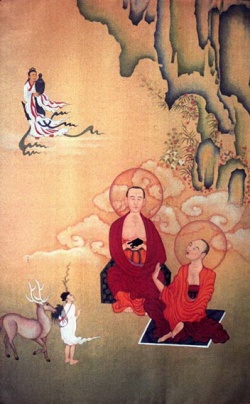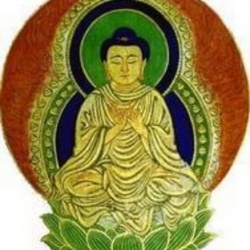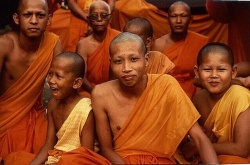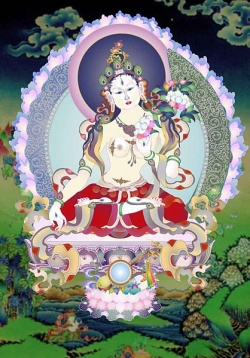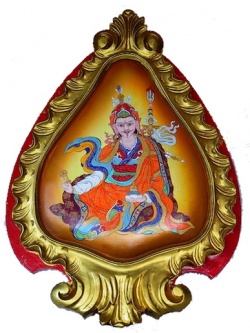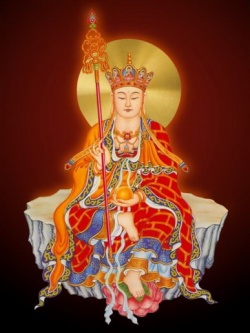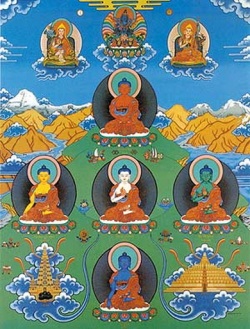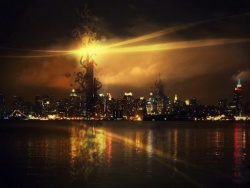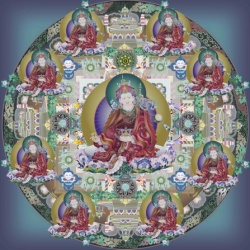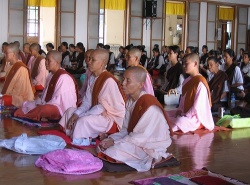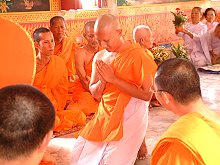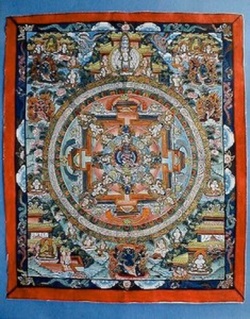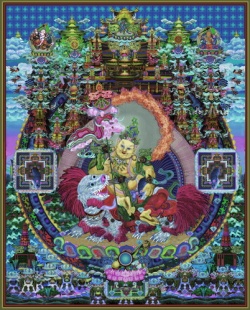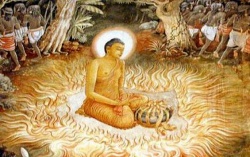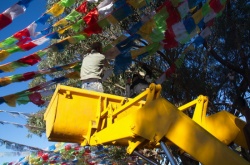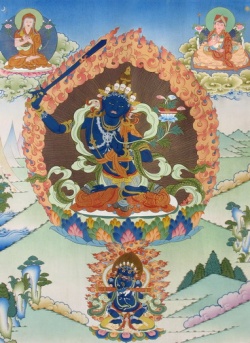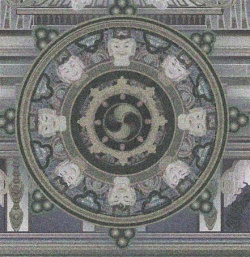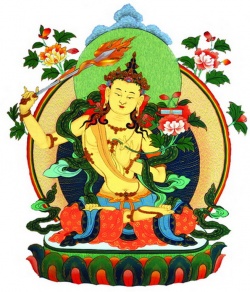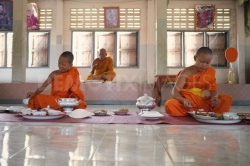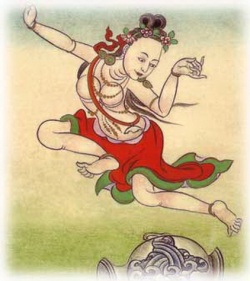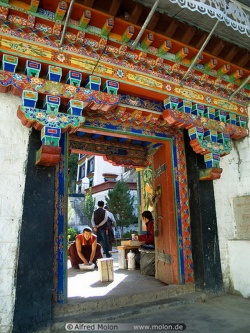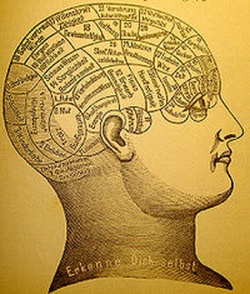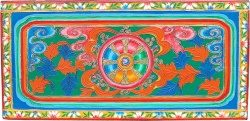A discussion on Ghosts
Dear Venerables and Dharma Friends:
Tonight I am going to talk about ghosts.You must all think it is strange that in this scientifically enlightened century anyone would want to talk about ghosts. In the past, even sages avoided the subject of the supernatural if they could. Confucius never spoke about ghosts. Yet, here we are on such a dark night getting ready to discuss ghosts. That seems a little strange, does it not? At the mere mention of ghosts, frightful images instantly arise in our minds of their pale faces, their wild hair and their sharp fangs. The truth is, however, ghosts generally are not very frightening. In fact, many of them are quite cute. Ghosts are like different types of animals: some of them are as frightening as lions and tigers, while others are as cute as bunny rabbits and as gentle as little kittens.
Buddhism does not teach us to worship ghosts, but Buddhism does recognize that ghosts exist. The realm of ghosts is one of the six realms of existence among sentient beings. (The six realms are: hell, ghosts, animals, humans, heaven, asuras.)
Many people do not believe in ghosts. Some people even purposely deny the existence of ghosts. They would often say smugly, "Humbug! I do not believe in ghosts." However, just because some people deny their existence, does that mean that ghosts really do not exist? People all over the world believe in ghosts. There are stories about ghosts even in the most scientifically advanced countries. The ghost of Abraham Lincoln is said to appear sometimes in the White House. A tourist pamphlet has been published which describes the twenty-nine well-known haunted houses in the United States.
Here in Taiwan, I personally have visited two houses where ghosts are known to appear. One is a house in Chiayi. It is a beautiful modern home with a large garden, but no one dares to live there because of the ghosts. In Taipei, I visited another ghost house on Jenai Road, right near a police station. The door of the house is bolted shut and no one has lived there for years. People say ghosts often appear in the house.
We do not have to deny the existence of ghosts regardless of whether they actually exist or not. We already know there are many different kinds of creatures living along side us. Birds, fish, insects and animals of all sorts add to the beauty and variety of life here. If there are also ghosts among us, would the world not be that much more interesting? Is it not narrow-minded and arrogant of human beings to deny the existence of life forms different from themselves? People are active in the day and in the early evening. Ghosts are active only late at night. They do not interfere with us and we do not interfere with them. Is that not a convenient arrangement?
In the Twenty-five Historical Tales there is a story about a scholar named Ch'ien-li Yuan. Even though Ch'ien-li Yuan had read many books and written many poems, he still did not believe in ghosts. Late one night, a very refined and scholarly gentleman visited Yuan Ch'ien-li. The visitor was a stranger, but he spoke very well and the two men soon fell to talking about all sorts of things. Eventually, their conversation turned to the subject of ghosts. Ch'ien-li Yuan was forceful in his denial of the existence of ghosts. He said, "Humbug! I do not believe in ghosts. How can someone like you be as superstitious as fishmongers and country folks?"
Tactfully, his guest gave repeated examples to persuade Yuan that ghosts did exist, but Yuan continued to deny even the possibility of their existence. "Until I actually see one with my own eyes, I will never believe in ghosts," he said.
At this, his guest's demeanor changed dramatically. "Sages and scholars throughout the ages have believed in ghosts, but you maintain they do not exist. Well, watch this... because I am a ghost."
Suddenly the guest's face began to change into a hideous ghost face with wild hair and blazing eyes. Yuan was so frightened that he lost all color in his face and became ill. Within a year he was dead.
I do not know whether any of you believe this story or not. You can test yourselves. If a lone scholar in a white robe visits you in the middle of the night, will you dare to talk to him? What if a shy young woman with a pale face comes to your door at midnight, will you let her in?
Many people have the mistaken belief that after death, everyone turns into a ghost. Dead bodies frighten many people because they believe the ghost of the body will attach itself to them if they draw too near. When parents pass away, many Chinese have memorial services for the ghosts of the deceased. They think their deceased parents and grandparents are ghosts wandering in hell, and if they do not appease them with ceremonies and gifts, they are not fulfilling their duties as filial sons and daughters. However, is this really a respectful attitude when you think about it? Why do people not believe their ancestors may be reborn in heaven or the Pure Land instead?
Though Buddhism recognizes the existence of ghosts, Buddhism does not teach us that everyone turns into a ghost at death, nor does everyone go to hell. After death, some people may go to heaven and still others are quickly reborn as human beings. A person has to generate a lot of bad karma in this life to become a ghost after death. Therefore, how can we assume that all our deceased ancestors have become ghosts? Furthermore, the real ghosts do not always have the power to harm us, and they are not nearly as scary or as evil as is commonly believed. Let us discuss what ghosts are like.
I. The Good and Bad Ghosts and the Law of Causation
In this world, there are good people and bad people. In the world of ghosts, it is the same. There are good ghosts and bad ghosts. Even though there are bad people in this world, good people outnumber them by quite a lot. It is the same with ghosts. There are some very evil ghosts, but most ghosts are good ghosts. People, sometimes, are much worse than ghosts. Human beings sometimes will do things no ghost would ever consider doing.
In Nanyang there once was a man named Ting-po Sung. One night Sung was hurrying home when suddenly he saw a ghost. Sung acted as bravely as he could and asked, "Who are you and why are you walking so strangely?"
"I am a ghost, that is why. Now, who are you?" the figure answered.
Sung was frightened to hear the ghost's reply, and he was even more afraid to admit that he was a human being. Might not the ghost harm him if he admitted that? In a moment's inspiration, Sung decided to do what human beings do best—lie. "Oh! I am a ghost, too," he said.
"You are a ghost, too, are you? Well, where are you going?"
"I am on my way to the city," Sung replied.
"Great," the ghost said, obviously pleased to hear that. "I am on my way to the city, too. Let us walk together."
Sung had no choice but to accept the invitation. With great trepidation he fell in behind the ghost to walk to the city. After a while, when they both began to show signs of fatigue, the ghost turned and made a suggestion. "The city is still far away," he said. "Walking like this is tiring. Let us take turns carrying each other instead. That way we can still make good progress and one of us will be able to rest. What do you think about this?"
"This is a good idea," Sung said.
"Okay, I will carry you first." With that, the ghost hoisted Sung onto his back. "Wow! Are you ever heavy! How did you get so heavy?" the ghost asked.
Ghosts have no definite form and no weight. They are a kind of spirit or a kind of energy (ch'i). They can pass through walls and become invisible at will. So, to a ghost, a human being is very gross and heavy.
As soon as Sung heard the ghost's question, he made up another lie. "I am so heavy," he said, "because I died just recently."
The ghost believed Sung and they continued to travel along with the ghost carrying Sung.
After a while, they came to a river. The ghost stopped and said, "We better swim across here." With that he dove into the water and, with the grace of a cloud flying through the air, swam to the other side. When the ghost got to his feet and turned around, he saw Sung still struggling in the middle of the river, splashing the water and panting very loudly. Gradually, Sung got closer. When he reached the bank, the ghost hurried over to ask him, "Why do you make so much noise when you swim? You will scare everybody around here!"
Sung could see that the ghost was getting suspicious of him so he used his best trick and repeated his lie from before. "I just died, so I really have not learned to swim yet," he said.
The two started for town again. As they walked, Sung thought to himself, "This is a bad night for me. Here I am walking along with a ghost. I have to think of some way to get away from him!" In an innocent manner, Sung asked the ghost, "Friend, I just died, and I am not all that clear about the world of ghosts. You have much more experience than I do. Tell me, what is the most frightening thing for us ghosts? What do we most need to watch out for?"
"Human saliva," the ghost replied. "If a human being ever spits on a ghost, that ghost has had it. There is nothing he can do to save himself."
The ghost was candid with his reply. Above them the sky was slowly starting to take on a shade of silvery gray. Dawn was approaching. The two were now close to the city.
Sung waited for a chance when the ghost was not looking, and spit a large gob of spittle on the ghost's back. Immediately, the ghost began to twist and turn. Then he fell to the ground, writhing in agony before he completely disappeared. In his place stood a small mountain goat. Sung took the goat into town and sold him for a good price.
This little story displays well the cruelty and deceitfulness of human beings. Sometimes ghosts are willing to help us, but we repay them by striking them with such cruel force. It really is true that sometimes people are much worse than ghosts.
Evil ghosts capable of harming human beings do exist, but if we are moral and kind throughout our lives, they can do us no harm. There is a Chinese saying which applies well here, "If we do no evil in the day, we need not worry about evil ghosts knocking on our doors at night." The ghosts outside of us are not nearly as frightening as the ghosts inside of us.
Once there was an old monk who was just sitting down to meditate when a ghost with unkempt hair and wild eyes appeared before him, trying to disturb his peace of mind. The old monk looked at him and said, "Oh my, what is this? What a mess! Look at that hair, and those eyes! You are really in no shape to be visiting people!"
When the ghost saw that he had failed to frighten the monk and was being admonished instead, he wrenched up his face, bared his sharp teeth and stuck his long tongue far outside his mouth.
The monk only said in reply, "What is so great about that? Your face is the same as mine; it is only a little paler and your teeth are sharper and your tongue is longer. That is all."
When the ghost saw that once again he had failed to scare the old monk, he changed his appearance again. He made his eyes and his nose disappear. Then he made his hands and feet disappear. However, the monk stayed the same, behaving as if nothing special were happening.
"My, you are pitiful!" he said. "You have no eyes, nose, hands or feet. I really feel quite sorry for you!"
With this response, the ghost at last gave up trying to scare the monk and disappeared. When the old monk saw the frightful appearance of the ghost, all he felt was compassion for him for having accumulated such bad karma to be turned into a ghost. Mercy has no enemies. In the face of compassion, all perverse and evil forces melt into nothingness.
We all know that people fear ghosts, but, actually, ghosts fear people much more than we do them. When ghosts see people, they run away as far as they can. They behave the same way wild animals do when they see people: they go and hide. Ghosts never come out in the day; they always wait until nighttime. The reason is that they fear people so much they come out only when the fewest people are around. If you understand this, then the next time one of you sees a ghost, you need not panic. Ghosts exist in a different realm from us and their karma has nothing to do with ours.
The Records of Hell contains a story about a man named Te-ju Yuan who got up in the middle of the night to go to the bathroom. In the bathroom, Yuan suddenly saw a giant ghost standing quietly in front of him. The ghost had enormous eyes and a black face. He was wearing a long white robe. The two looked steadily at each other for a while. Then, Yuan broke into a laugh and said, "People have always told me that ghosts have ugly faces. Now I can see for myself that they are right!"
When he heard Yuan say this, the ghost felt so embarrassed his ears and face turned red and he had to leave. Sometimes a ghost's sense of shame can be even more developed than a human being's. If we are clear in our minds about what constitutes good and bad, and if we always try to behave in the right way, no ghost will ever dare interfere in our lives.
There are reasons why ghosts exist. There are certain kinds of karma which cause people to become ghosts. The Buddhist Karmic Rewards Sutra gives ten reasons in all:
1)
The body has committed evil. One has killed, or stolen, or indulged in other evil behavior.
2)
The mouth has committed evil. One has repeatedly lied, slandered, or spoken with great harshness. One has indulged in idle, thoughtless talk.
3)
The mind has committed evil. One's thoughts have been full of greed, hatred, ignorance or other defilements.
4)
Greed. One has been greedy and grasping and not understanding of the value of giving.
5)
Covetousness. One has been envious and wanted things that do not belong to oneself.
6)
Fawning and jealousy. One has often been jealous of other people and thus created evil thoughts.
7)
Perverse ideas. One has denied the value of morality and the difference between good and bad.
8)
Attachment and not letting go. One feels strong attachment and clinging in one's mind and cannot joyfully let go.
9)
Dying of starvation. People who starve to death become hungry ghosts.
10)
Dying of thirst. People who die of thirst become ghosts.
One of the Buddha's greatest disciples, Mahamaudgalyayana, often traveled to hell to ask the ghosts there about their conditions and about the causes which had sent them to hell. In the Mahamaudgalyayana Sutra there is a fascinating record of one of Mahamaudgalyayana's conversation with the ghosts in hell. From their exchange, one can glean how the law of cause and effect works. At one point a ghost asked Mahamaudgalyayana, "Venerable One, here I have fallen into the ghost realm and I suffer all kinds of pain and punishment. Why does my head always hurt so much? It feels like it is about to split open!"
Mahamaudgalyayana answered him, "When you were a human being you often hit other people on their heads. For this reason you not only have become a ghost, but you also have to endure those terrible headaches."
Then another ghost begged him, "Venerable One, here I am a ghost and my life is miserable! I have to sleep out on the street because I have no home to protect me from the wind and rain. Why do I have to suffer like this day after day?"
Mahamaudgalyayana answered, "In your last human life you were very wealthy and you had a beautiful home, but you never helped others. Instead, you only made it difficult for anyone in need of shelter. Therefore, you ended up suffering, sleeping outdoors in the cold and rain now."
Then another ghost asked, "Venerable One, now that I am a ghost I still have lots of money. Yet, it is strange because I never spend any of it. I just walk around in old patched clothes all the time. Why is that?"
Mahamaudgalyayana answered him, "When you were a human being, you were often generous with others but after giving something away, you always had second thoughts for having been kind. Your generosity in that life is the cause for your having wealth now, but your wavering has made you live like a poor person."
As all the ghosts crowded around Maha-maudgalyayana to learn more from him, a sallow, emaciated ghost standing alone at the edge of the group slowly intoned in a long quavering voice, "Venerable One, here I am a ghost, but I can eat nothing! Why is that? I am so hungry that I feel dizzy all the time! Why is that?"
Mahamaudgalyayana answered, "When you were a human being you worked in the kitchen of a temple, and in that position you often stole money which had been donated for food. If a devotee gave you twenty coins, you would keep ten for yourself and use only ten to buy food for the kitchen. The result of those actions is that now you have to go hungry yourself."
"Venerable One," another ghost complained in desperation. "Now that I am a ghost, I suffer so much pain. My body hurts all the time as if it were being poked with needles and slashed with knife blades. I feel as if I am being burned in a fire. Why do I have to suffer so much?"
"When you were a human being you often caught fish and hunted animals. You killed so many creatures that you have to suffer their pains now," Mahamaudgalyayana said, answering him with great compassion.
When the ghosts at last began to fall silent and reflect on Mahamaudgalyayana's words, one of them in a halting and uncertain tone asked, "Venerable One, why have I become a ghost who is so slow at thinking? I am so stupid compared to these other ghosts who all possess quick minds. Why is that?"
"Because when you were a human being you loved to indulge yourself in alcohol. On social occasions you often encouraged people to drink alcohol and to indulge in meat, so now you are a little slow in your thinking and not as nimble as the other ghosts."
Mahamaudgalyayana patiently stayed with the ghosts until all of their questions had been answered, and then he left. From these questions and answers recorded in Buddhist sutras, we can get a pretty good idea of why some people become ghosts and what kinds of punishments fit what kinds of transgressions. Chefs and homemakers be warned! Do not take money intended for food and keep it for yourselves, or you too might become a hungry ghost one day! If you are in business, be careful what you do! Do not think you can get away with skimming a little extra for yourself or with cheating your customers. For those who slaughter for the sake of satisfying their tastes and those who indulge in intoxicating drinks, be forewarned. Do not let a moment of self-gratification cause you endless suffering and regrets.
II. Different Kinds of Ghosts and Their Appearances
How many kinds of ghosts are there and what do they look like? The Abhidharma-nyayanusara says there are three kinds of ghosts.
A. Wealthy Ghosts
Wealthy ghosts are something like wealthy human beings. They enjoy a lot of offerings and they are never in want for food or clothing. Examples of such ghosts include those honored in an ancestral shrine or those revered for their great powers and blessings.
B. Not-So-Wealthy Ghosts
These ghosts are like most people in the world. Although they receive some offerings, they are less well-off as wealthy ghosts.
C. Poor Ghosts
These ghosts are much like homeless human beggars. They have no place to live. Sometimes they eat and sometimes they do not. Their livelihood depends largely on handouts from others. For the most part, these poor ghosts wander around alone in very remote parts of the world. Only when there is a special offering made for them in the temple can they get something to eat.
The Abhidharmamahavibhasa-sastra says that there are two kinds of ghosts.
A. Ghosts with Dignity and Prominence
These ghosts are strong and tall. They wear ornate headpieces, flower garlands, and beautiful clothing. They eat delicacies and ride in carriages pulled by horses or elephants. They have servants who care for them wherever they go and they live lives full of pleasure and amusement. They are much like royal people in the human realm. The Chinese folk god, Cheng Huang Lao Ye, is this kind of ghost.
B. Ghosts Lacking in Dignity and Prominence
These ghosts have messy hair that flies all over and covers their faces. Their clothing is ragged, at best, and often they are forced to go completely naked. Their faces are pale and ugly. They carry old broken, begging bowls. They are very similar to downtrodden beggars in the human realm.
Ghosts can also be divided into the general categories of large and small ghosts. Large ghosts are about one yojana tall, based on the Indian measurement units. One yojana is approximately seven miles. Imagine that! They are huge creatures. In Chinese, they are sometimes called "big-headed" ghosts because their heads are as big as mountains. However, their long throats are as narrow as needles and, for the most part, they are unable to eat anything. For this reason, they are very weak and they have to use canes whenever they want to walk somewhere. Their hair is long and messy and dirty. In contrast, small ghosts are very tiny. They are about as big as newborn babies.
There also are beautiful ghosts and ugly ones. Beautiful ghosts are so beautiful they look like heavenly beings and are not in the least bit frightening. Ugly ghosts are remarkable especially for their runny noses and the sores all over their bodies, which constantly bleed and emit noxious pus. There are noble wealthy ghosts and lowly impoverished ones also. Noble ghosts, like the Ghost King of Great Strength, are venerated by people. Lowly ghosts are orphaned ones who wander from place to place.
Whether ghosts are wealthy or poor, beautiful or ugly, with or without dignity and prominence, large or small, they all are representative of human beings in some way, and they do not all live in hell. Have you not also seen signs of them in this world?
Zen Master Ju Man once had a friend named Wang. When Wang died, Master Ju Man held a special Dharma service chanting sutras to help him in the next rebirth. A year or so after Wang's death, Master Ju Man set out for Yangchou in Chiangsu Province. While he was on the road, Master Ju Man suddenly saw his old friend Wang standing in front of him. Master Ju Man was astonished at the sight of him and asked, "Did you not die already? How is possible that you are here now walking around?"
Wang quickly interrupted the Master. "Hush, do not talk so loudly. Come with me into the mountains and we will discuss everything in detail."
When the two at last got to a remote mountain gorge, Wang said, "Master Ju Man, let me tell you now. I am not a human being. I am a ghost. When I was a human, I never did anything bad and I often tried to help other people. In addition to that, there were all those sutras you chanted for me after I died. Now King Yama of Hell has appointed me to be an investigator for him in the human realm."
"Amazing! So, what do you do as a ghost investigator?"
"It is my job to make a detailed record of human acts of corruption, murder, theft, depravity and cruelty. I record everything I see and report all of it to King Yama. He keeps these records and makes sure that all transgressions are repaid in kind. People who murder will experience being murdered themselves. People who steal will someday have things stolen from them, and so on."
After Wang finished speaking, he reached into his clothing and pulled out a red flower to give to Master Ju Man as a token of payment for the kindness Master Ju Man had shown him when he was still a human being. When Master Ju Man saw the flower, he tried to refuse it. "I am just a monk," he said. "What do I need this flower for?"
"This flower is not like other flowers," Wang said. "If you carry it in your hand, it will allow you to tell if someone is a human being or a ghost."
"How will carrying a flower in my hand help me do that?" Master Ju Man asked.
"If you have this flower in your hand as you walk down the street, a righteous person will never look at it. Ghosts, however, will stare at the flower with great intensity. If an individual stares at the flower and then makes gestures to attract attention, then you will know that this individual is a show-off ghost. If a ghost looks at the flower and then looks at you, you will know that he is a lustful ghost. If the ghost looks at the flower and then looks at himself, then you will know that he is a greedy ghost. If a ghost looks at the flower and then starts rubbing his hands together, you will know that he is a cheating ghost."
After Master Ju Man and Wang had parted company, Master Ju Man walked into town carrying the red flower in his hand. The first person who came toward him sauntered along contentedly, never once glancing at the flower. "Good, that must be a righteous human being," Master Ju Man thought to himself.
He walked a little farther and saw a very fashionable woman dressed in beautiful clothes. She stared directly at the flower, and patted her cheek.
"Oh no, that must be a show-off ghost," Master Ju Man thought.
After a while, a man, also dressed very well, walked toward Master Ju Man. He stared at the flower, turned his eyes to Master Ju Man, and said disappointedly, "This is only an old monk."
"Oh no, he is a lustful ghost!" the Master muttered to himself, somewhat displeased.
Master Ju Man kept walking and before long another person approached him. This one stared at the flower and then at himself. "Oh no," Master Ju Man thought. "He is a greedy ghost!"
Master Ju Man turned and started down another street. Far down the street someone started staring at the flower and rubbing his hands together. "Oh no, now I have run into a cheating ghost. This flower is really powerful. Look what it is showing me!"
Master Ju Man walked some more and thought about what he had just seen. Before long, he found himself at the gate of his temple. Thinking it would be inappropriate to bring the red flower into the temple, Master Ju Man threw it on the ground behind him and started to enter the temple gate. In seconds, he heard a lot of noise and arguing going on behind him. He turned and saw that all the ghosts he had just seen in town had been following him. Now they were fighting over the flower he had thrown on the ground. At last, one of the ghosts prevailed in the fight and held the flower in his hand. As the other ghosts stopped to look at it, Master Ju Man saw that the beautiful red flower had turned into a mere bone from some dead body.
In this world, sometimes we try so hard to attain wealth, fame or power, but in the end what do we really get? Is it not just like that story? In the end, we are left holding nothing but a pile of old bones and a handful of dirt.
There is an old Buddhist saying, "Today I know nothing of tomorrow: Why should I waste my time on disputes and discords?" Therefore, we should not fight over the flowers of superficial glory and vanity in life. Rather, we should honestly and diligently work toward meaningful goals in life.
III. Where Do Ghosts Live and What Are Their Pleasures and Pains
Human beings live on the earth in the human realm. Where do ghosts live? In human life there is pleasure and pain. What gives ghosts pleasure and pain?
The Abhidharmamahavibhasa-sastra says that wealthy ghosts live in mountain valleys and gorges, on the coasts of the world's oceans, in the air, in forests or in temples where people worship them. They are like people who live in penthouses in cities or in luxurious resorts in the picturesque countryside. Poor ghosts live in remote areas near graveyards, or in piles of grass and wood, or in latrines, or in deserted areas. Poor ghosts do not have homes for themselves, but usually wander around like human beggars, completely exposed to the natural elements of wind and rain. They are mired in anguish.
Some ghosts suffer a great deal and some of them actually have quite a lot of fun. Suffering ghosts experience terrible hunger and unbearable thirst. They never have anything to eat and even if they see a river, they cannot drink from it. If ever they do lift water from a river to drink, it will instantly turn into flames in their throats. Even the most delicious food offerings are useless in relieving their perpetual hunger. If you want to help these beings, you may offer them a simple meal of fruits and vegetables in a Buddhist ceremony. Through the merits and blessings of the Buddhist sutras and mantras, the burning fire in their throats may cease, thereby allowing them to eat. Definitely do not offer them sacrifices, otherwise, you will only increase their evil karma and suffering.
The Ksitigarbha Sutra says that, of the merits in chanting sutras and making offerings for the ghosts, six out of seven parts will benefit human beings while only one in seven parts will benefit the deceased. From this we can see how important it is to use our time here while we are healthy to do as much good as we can. If we wait until we are dead and our bodies are stretched out and stiff, then it will be too late to do anything for ourselves, and other people will not be able to do us much good either.
Happy ghosts live pleasant lives full of good food and beautiful clothes. They have vehicles to take them wherever they want to go and they generally pass their time pleasantly. Happy ghosts have it pretty easy because when they were alive, they were generous towards others. They became ghosts, though, because they often regretted their generosity or felt stingy in their hearts. Even though the life of a happy ghost is more pleasant than the life of a human being, it is still much better to be a human being. These ghosts are very timid and only dare to come out late at night. They are afraid of light and never appear in the day. If they happen to come across a human being, they run and hide in dark places because they are afraid to touch people. Once we understand how afraid of us ghosts are, we will not feel the need to fear them so much.
Sometimes human beings unintentionally disturb ghosts. In Taiwan, there is a folk custom of "marrying" a dead daughter (so she will have a place on someone's ancestral shrine). There is a story about a couple who tried very hard to find someone to "marry" their daughter who had died before she was married in life. The daughter had not married in life because she did not want to, and their forcing her to do so after death only angered her and caused her more misery.
"Father, Mother," she said. "when I was alive you tried to force me to marry to carry on the family and now that I am dead and have become a ghost, you still want to force your will on me!"
Since the ghost thought this young man was good-for-nothing in wishing to "marry" a ghost, she intentionally caused her "husband" a lot of trouble. On the "wedding night," she came and hit her "husband" on the head, boxed his ears and struck him in the face. She continued to push and hit him all night long. The "bridegroom" never once caught sight of his "bride," but when the morning came, his face was swollen from being punched so often. The next day he took her name away from his family shrine and returned it to her parents.
Why do people do such ignorant things? How strange that a man would consider sleeping with a ghost and putting her name in his family shrine. What good could that ever bring? In Taiwan, some people also have the custom of burning paper representations of automobiles, houses, American dollars, television sets, refrigerators and other things so that these items will go to the ghost realm where their departed loved ones can enjoy them. (The smoke is thought to carry them to the ghost realm.)
The truth is, ghosts have five types of magical powers, and they can move around by just thinking of where they want to go. They do not need cars. If they did use cars, it would take them longer than if they had gone by their own powers. If everybody burned a paper car for their loved ones, pretty soon hell would be overloaded with automobiles. There would be traffic accidents and no one would ever get anywhere. In this human realm, home appliances are either 110 volts or 220 volts. If they do not have the right outlets in hell, our appliances will be useless there. American dollars are used almost all over the world, but do you think they will be accepted in hell, too?
Ghosts have their own ways of living and we do not need to be too concerned with them. A loved one who has passed away may have gone to heaven or been reborn as a human being. You can not be sure they have become ghosts and that their lives are full of sorrow and need. If we are going to honor our ancestors, we do not need to burn paper money for them because we will only end up with a heap of useless ash. It would be much better for everyone to donate money in the names of our ancestors. We can build schools, establish scholarship funds and do other good things in their names. In this way our ancestors can make a useful contribution to the human realm.
In Chinese literature, there is a wonderful and vivid story about ghosts. Once there was a ghost who had just left his human body. As a new ghost, he discovered that he was so inexperienced he could not find anything to eat. He was getting really hungry when he met an old ghost. The old ghost said to him, "Young fellow, why are you so skinny and why is your face so pale and gaunt?"
"I have been a ghost for quite a few days now," the new ghost replied, "but I have not yet succeeded in finding anything to eat. That is why I look so bad. My friend, you have been a ghost for a much longer time than I have. Please tell me how to get some food!"
"That is so easy," the old ghost said. "What I usually do is to play some ghost tricks and do something supernatural. That is what gets me fed!"
"So that is how you do it," the new ghost said. "Now I understand."
The new ghost was delighted with his new understanding and immediately ran to the east side of town. He entered a poor person's house where someone was grinding flour. As soon as he had the chance, the ghost stepped up to the grinding wheel and started to move it himself. When the person in the house saw that the wheel was moving all by itself, he called out in surprise, "Wow! The wheel is moving all by itself and no one is pushing it! There must be a ghost here! It must be our compassionate Buddha who sent him here to help us because we are so poor and have to work hard all the time!"
The new ghost kept pushing the grinding wheel all night long. He was made very tired by the work and his eyes began to glaze over, but when dawn came he still had not gotten anything to eat. He ran straight back to the old ghost.
"Hey, you! You told me to play some ghost tricks to make my life better," he complained angrily. "I followed your advise completely. I worked all night, yet I did not get one thing to eat!"
"Oh, you fool," the old ghost said. "The home you went to believes in Buddhism. Buddhists are not afraid of ghosts. Why should they give you anything to eat?"
"So that is how it is. I see. I will try another place tonight," the new ghost said. That night he slipped through the shadows and went to a different house on the west side of town where some people were pounding rice. He picked up the pounding stick and began pounding the rice for them. When the people saw what was happening, they were very surprised.
"Amazing! Look at that! Last night the Buddha sent a ghost to someone's home to help him grind flour, and tonight Lao Tzu has sent a ghost to help us pound rice."
The new ghost worked as hard as he could until the sky began to lighten and he heard roosters crowing. His back and arms were terribly sore and he felt tired all through his body, but still he had not been given a single thing to eat. He raced back to the old ghost, more than a little bit angry this time.
"Now, try to explain this to me. Why did they not give me anything to eat? I do not understand!"
"My young friend, those people were Taoists. Not only do they not fear ghosts, sometimes they even try to catch them!"
"Then what should I do? Do I have to go hungry day in and day out? I can hardly bear it!"
"Here is what you do," the old ghost said. "Find a house without any Buddhist statues or signs of Taoist gods. In that place, anything will be possible."
The new ghost looked all over the town until at last he found a house which had no gods and no images of the Buddha in it. Inside there was a room full of people enjoying a feast of fish, meat, vegetables and wine. When the new ghost saw their sumptuous meal, he was so tempted that he began to drool. He had to promptly think of what to do to get them to feed him. He saw a skinny little dog crouched by one of the legs of the table. The dog was wagging its tail in the hope that someone would throw him a bone. The ghost grabbed the dog and started to race around the room so it looked to the people as if the dog were flying.
"Look at that!" someone exclaimed. "How can that be? How can the dog be flying around like that? Did someone cast a spell on him?"
The whole room fell into a commotion as the dog flew around and around. Somebody suggested that they call on Jesus to help them. Another person said, "No, Jesus can help people change, but he cannot do anything when it comes to ghosts."
Someone else said, "Let us read Confucius's words out loud. Maybe he can help us!"
Another person answered, "No! Have you forgotten that Confucius refused to talk about ghosts? He told us to keep away from them! He will not be able to help us, either!"
Things went on like this with people arguing back and forth for quite some time. At last they decided to call on a spirit medium to exercise his magical power.
"This ghost is bewitched. Let us kill the dog and prepare for him a table of food complete with three types of meat and wine. That will appease him!"
The people quickly did as instructed and prepared a bounteous feast for the ghost, who enjoyed every last bite of it. "That was great!" he said when he was finished. "That was really good!" The food was so good, in fact, the new ghost never wanted to leave that house again. Every night after that he performed some new trick to get the people to make him more food. So, this is truly the way to "invite a ghost into your house."
In life, we have to be careful to always treat others with kindness and to keep ourselves well within the limits of good behavior. Definitely do not ever invite a ghost into your home. Sometimes people fall in bad company, with robbers or murderers. If you ask that kind of person to help you even once, you will have a world of trouble on your hands. You may even lose your life for it. In Taiwan, there are some really foolish customs wherein people worship ghosts, rocks, trees, and practically everything. If you follow these customs and invite all these spirits and ghosts into your home and honor them as special guests, you will be inviting disasters onto yourself. We should be careful to give our respect only to people who deserve it, to people who are honorable in their own lives. To ensure our well-being and safety, we should keep our distance from people who worship spirits and practice magic.
IV. The World of Ghosts and the Human Life
In this universe, there are respective worlds for the ten Dharma Realms (Buddhas, Bodhisattvas, Pratyekabuddhas, Sravakas, and the six realms mentioned earlier). There are the Buddhas' worlds such as the world of the Eastern Pure Land of Azure Radiance and that of the Western Pure Land of Bliss. Heavenly beings have their worlds subdivided into three realms and twenty-eight heavens. We human beings have our world with the three oceans and five continents. Among human beings there are different races with different body types. Some of us are rich and some poor, some are smart and some are a little slow. Animals, too, have their worlds; some of them fly in the air, others walk on the ground and still others swim in the ocean. In the same way, the ghosts in hell have many different ways of being. Ghosts live in a world something like the one people live in. They have families, and they have to work to maintain themselves. Some of them are rich while others are poor. Their world, too, has disputes and grievances. Ghosts have many different sorts of characters; some of them are violent and cruel, but some of them are kind and good.
Ghosts and human beings actually live very close to one another. Not all ghosts live in hell. They are right here with us, to the left and right of us. You do not have to travel to hell to find ghosts because ghosts are all over the place, right here in our world. What kinds of ghosts live in our world? Look around you. Everywhere you can see people who abuse drugs, who waste themselves away in sexual indulgence, who harm others, who commit violent acts, who rob and steal and murder. Are these people not worse than ghosts? Are we not all tempted at times to be like ghosts ourselves, to withhold help when it is needed, to turn away when we see something wrong, to be suspicious, to speak badly about our friends, to be gluttonous and mean spirited when we know full well what the right thing to do is? It really is true that "human ghosts" can be much worse than the ghosts in hell.
When we think of ghosts, we usually only think of asking a monk to come to our homes and bless them, but we often do not think of blessing the "ghosts" of our world. When ghosts are blessed and delivered from suffering, we can all enjoy peace in our minds and in our dwellings. Likewise, when "human ghosts" are delivered, morality would be elevated and our society can become peaceful. How should we proceed to deliver those "human ghosts"? The Buddhist methods include taking refuge in the Triple Gem, upholding the Five Precepts, practicing the Six Paramitas (perfections), and performing the Ten Virtues. Truly taking refuge in the Triple Gem can bring deliverance as follows: taking refuge in the Buddha means never falling into the hell realm; taking refuge in the Dharma means never falling into the animal realm; taking refuge in the Sangha means never falling into the hungry ghost realm. If all of us would uphold the Five Precepts of Buddhism—no killing, no stealing, no sexual indulgence, no harsh words and no drugs or alcohol—we would all be much farther from evil. We would no longer be planting new seeds of evil that one day might cause us to be reborn in the realm of hell or to become evil ghosts.
In this modern world, evil is present all around us. If for any reason any of you ever becomes tainted by any of that evil, please come quickly to Buddhism to purify yourself. If all of us would devote ourselves to promoting social values, to supporting education, to helping others and to raising the level of society's kindness, then all "human ghosts" would soon be freed from their sufferings.
Thank everyone of you for coming tonight. I hope that by our efforts, society can be purged of ghosts and that every person will become a moral and upright human being. Instead of thinking about ghosts, people should think about the Buddha. Instead of acting like ghosts, people should discover the Buddha nature inside them. Then this human realm will become like the Pure Land and none of us will have to worry about hell anymore
